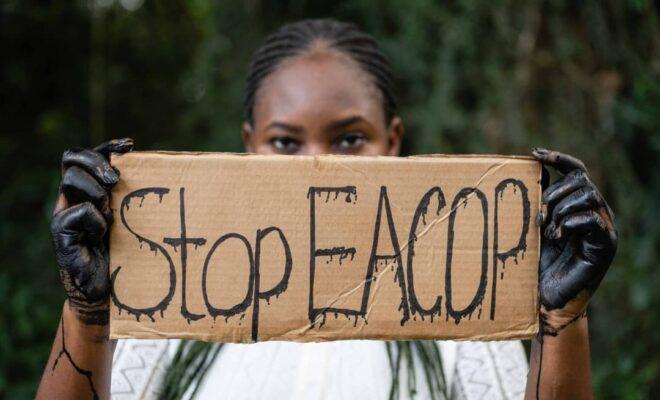The bold campaign to defund the East African Crude Oil Pipeline

Activists have convinced 20 big banks not to finance the controversial oil project leaving its fate in the balance.

Credit: Fridays For Future Uganda.
This February, the heads of TotalEnergies and the China National Offshore Oil Corporation (CNOOC) held a long-awaited meeting in Kampala. Together with leaders from Uganda and Tanzania, the French and Chinese energy giants signed a momentous Final Investment Decision for the East Africa Crude Oil Pipeline (EACOP). In doing so, what would be the world’s longest heated pipeline – a $5 billion behemoth set to transport oil 1,443km from Uganda’s Lake Albert to the port of Tanga in Tanzania – took another step towards its realisation.
As the decision to move ahead was inked, Patrick Pouyanné, CEO of TotalEnergies, which holds a 60% stake in EACOP, called it “a day of happiness”. However, his merriment belied a much more complicated truth.
EACOP’s backers, who intend to finance the pipeline with a partial loan of $2 billion, have yet to raise the money needed to construct it. Meanwhile, an international movement against the project is fast growing and specifically targeting banks and insurers to convince them not to fund it.
“Total is finding closed doors”
Environmental activists say that EACOP will displace thousands of people from their ancestral homes, tear through farmland, and destroy precious ecosystems. They say TotalEnergies’ plan to drill a hundred wells in Murchison Falls National Park will pollute the air and soil, and that the pipeline poses significant risks to the water sources of the Lake Victoria Basin on which 40 million people rely. Moreover, scientists calculate that the burning of the oil extracted and transported will generate 34 million tonnes of carbon each year, increasing Uganda’s annual emissions by a factor of seven.
“You cannot even imagine how big this project is,” says Omar Elmawi, head of the Nairobi-based #StopEACOP campaign, which coordinates the efforts of 260 civil society organisations.
Fighting an operation of this magnitude is daunting, but some activists have broken it down by focusing on the pipeline’s funding.
“The finance strategy of the campaign has been to look at the project and to identify what are crucial puzzle pieces that need to be in place for the project to move ahead – so things like the project loan or the insurance – and then to really focus on trying to block those pieces before they are in place,” says Coleen Scott, who focuses on the #StopEACOP campaign at Inclusive Development International.
This strategy began in 2018 when the NGO BankTrack drew up a list of TotalEnergies’ main financiers and began urging them not to bankroll EACOP. Of that group, which has since expanded to 35 potential funders, 20 – including, most recently, Deutsche Bank – have now ruled out funding the pipeline. Three – South Africa’s Standard Bank, Japan’s SMBC, and China’s ICBC – have signed up as EACOP’s financial advisors. And the dozen remaining have yet to declare their position.
“Total is finding closed doors wherever it looks,” says Ryan Brightwell, who leads the campaign.
While campaigners have recorded some significant successes in persuading big banks to distance themselves from the EACOP project, however, their work is made more complex by the fact that many of the same institutions directly fund TotalEnergies itself.
Barclays, for instance, provided Total $2.85 billion in finance between 2016-2020. BNP Paribas provided the French oil major $5.05 billion in the same period. And days before Deutsche Bank announced that it would not fund EACOP, it joined an $8 billion revolving credit agency for TotalEnergies.
Also complicating matters for activists is that, while some banks remain hesitant, big insurers are now signing on to EACOP. In May, the US-based conglomerate Marsh McLennan was revealed as the insurance broker for the project, meaning it will now take on the task of going to other insurers and convincing them to back to the pipeline too. Campaigners plan to apply the same strategy to insurers as they have to banks.
“Our job is to make Marsh’s job more difficult if not impossible,” says Scott of Inclusive Development International. “That means that we will be pressuring Marsh, itself, to pull out of this toxic project, and to not offer brokerage services.”
“Profits for a few”
Despite the opacity of the financial world, many activists in the global #StopEACOP campaign remain optimistic that they can stop the mega project in its tracks. However, TotalEnergies appears equally confident and determined to ensure it extracts enormous profits from its huge African asset.
The stakes could scarcely be higher for both the planet and the people in the project’s path.
“This pipeline is going to amplify the climate crisis and, by doing so, it is going to leave our people poorer and more vulnerable,” says Baraka Lenga, an activist with Green Faith International in Tanzania.
“We should think about the lives of local people, the lives of indigenous communities, not putting profit in the hands of a few,” adds Kayinga Muddu Yisito of the Community Transformation Foundation Network in Uganda. “These investments are for profits for a few, but not improving lives for citizens.”
The reporting for this project was supported by the Pulitzer Centre.






What the misleading information this is!
I NEED MORE CARBON LESS BAD THEN I THINK IN CARBON CHAINS LESS POLLUTING THAN NOT PROPANE